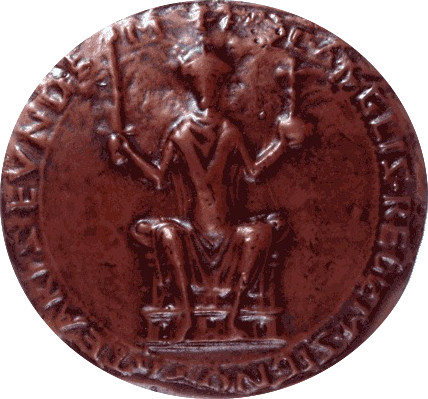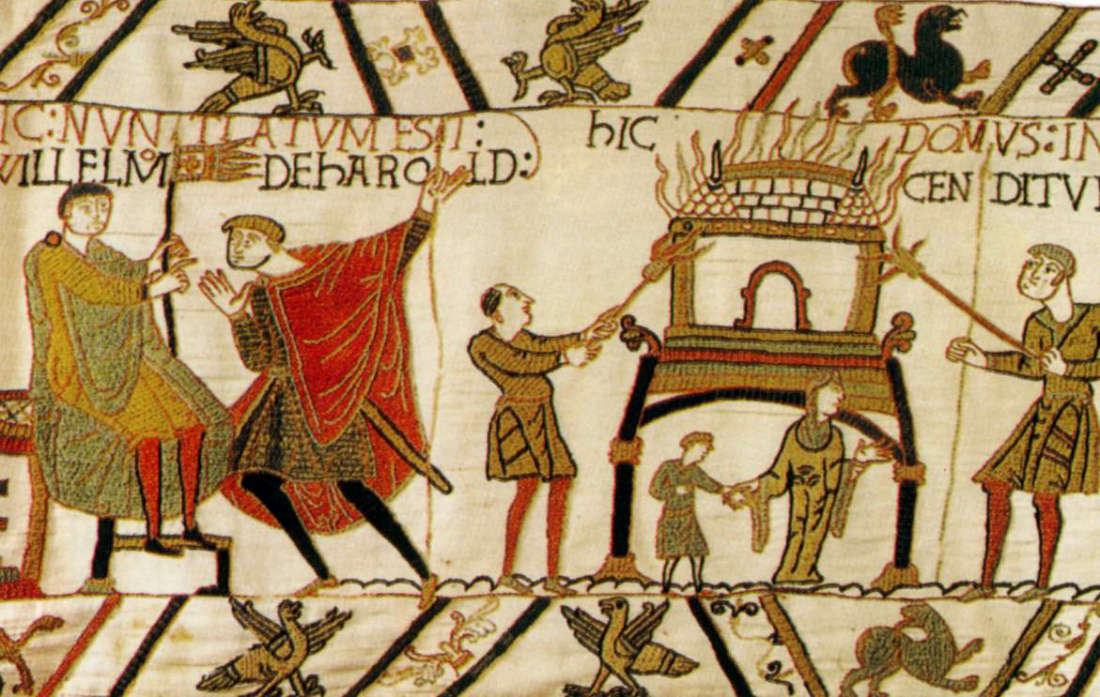'And after that it grew much worse'
The reality of conquest
William’s victory at Hastings in 1066 dropped the crown into his lap but not the kingdom. The months and years that followed saw his grip extend around the south as his followers seized lands and tore through towns to raise up castles.
The shock of this Norman tide, together with the slights dealt out to the last of the English nobility, kept the temperature at boiling point. Risings and invasions came and went in the south, but by the end of 1068 the main threat to William came from the north - the northern earls Edwin and Morcar, the Scots’ king Malcolm and the Danish king Swein Estrithson.
In 1069 William moved north with his army. A new phase of the Conquest was about to begin.
So far Orderic Vitalis has provided a largely measured account of William’s reign - a welcome change from the partisan justifications surrounding 1066. He sets out to be even handed, saying "I for my part, as the blood of either people flows in my veins, shall steer a middle course". Orderic is very much a product of the Anglo-Norman union, writing a generation later with room for perspective. This is worth remembering, since even with some poetic license the description of the Harrying of the North that he puts in William’s mouth as part of his deathbed speech is stark. In 1069,
I fell on the English of the northern shires like a ravening lion. I commanded their houses and corn, with all their implements and chattels, to be burnt without distinction, and large herds of cattle and beasts of burden to be butchered wherever they were found… subjecting them to the calamity of a cruel famine; and by doing so - alas - became the barbarous murderer of many thousands both young and old.
William I (as attributed to him by Orderic Vitalis)
It is not hard to imagine the great and the good of what remained of the English nobility returning home after a tour where they had been little more than trophies to find devastation and uproar. It is unlikely that the Normans had any respect for English claims to land and property, while the destruction of whole sections of towns and the requisitioning of materials for castle building would have been transforming the landscape. The impact would have been there for all to see.
William had ravaged his way through Yorkshire, burning 1069’s crops in their stores, 1070’s crops in the fields and the means to make more along the way. The bitterness Orderic reveals from a generation later shows just how long that kind of damage lasts. "[I]n this year there was a great famine" noted the Anglo-Saxon Chronicle in its typically terse style. Those who survived headed for the hills and woods, turning to pillaging as the only alternative for selling themselves into bondage. The wolves, we are told, came down from the hills. Disease was rife as bodies lay by the roadside.
In the wake of this, William held his Christmas court in the burned out shell of York, enthroned in full regalia. He would be king - of what was there or what was left.

In 1070 William turned his attention to Northumbria but word has travelled ahead of him. Villages were deserted as people cleared what they could and fled, leaving as little as possible to burn. Earl Waltheof surrendered and Swein, as we have seen, withdrew. Edwin for his part was murdered by one of his men. We will never know the details, but for some in the rebellion enough may well have been enough. His brother Morcar was captured and imprisoned.
Looking back, this was the end for the English even if it was not the end for William. It was the closest thing to a full uprising against the Normans at a time when they were still invaders. The most blistering example was made of it. From here on, those English that remained in William’s aristocracy were removed or replaced with Normans on their death, even down to the thegnly, or now knightly, class.
Earl Waltheof continued his resistance on and off, alongside holdouts such as Hereward the Wake. Malcolm of Scotland and the Welsh posed William a regular threat and prospect of Danish invasion lingered late into the 1080s. Norman threats began to boil too. William imprisoned his half brother and sometime regent Odo in 1082. William's son, Robert Curthose, installed as successor in 1066 should the worst have happened, rebelled with increasing frequency. Add to this the conquest of Maine by William with an Anglo-Norman force and his ongoing struggles with Brittany and the king of France, and threats were unceasing. The fighting never stopped.
It was like that to the last for William, as he was fatally wounded burning the town of Mantes. His horse reared up having stood on a hot ember and the pommel of William’s saddle hit him with more force than his body could take.
For someone thrust into his role as a child and not expected to survive much time at all, it had still been quite the achievement. England was secure, as was Normandy. William’s wishes for the succession were followed with at least initial calm. Florence of Worcester sums him up as ‘gentle to the good men who loved God, and stern beyond all measure to those people who resisted his will. The Anglo-Saxon Chronicle, written near enough the time of his death in 1087 adds:
…he was a very stern and violent man, so that no-one dared do anything contrary to his will. He had earls in fetters, who were against his will. He expelled bishops from their sees and abbots from their abbacies, and put thegns in prison, and finally he did not spare his own brother.
Anglo-Saxon Chronicle, 1087
The Chronicle continues: "Amongst other things the good security he made in this country is not to be forgotten - so that any man could travel over his kingdom without injury with his bosom full of gold". Some progress then, since the Norman army fell upon its reward twenty years previously. Fear, not love, was the order of the day. Security, but at a price.
Order’s deathbed speech for William shows what that price was:
I have subjugated England to my will. I have persecuted its native inhabitants beyond all reason. Whether gentle or simple, I have cruelly oppressed them… especially in the county of York, [where many] perished through me by fire and sword.
William I (as attributed to him on his deathbed by Orderic Vitalis)
‘Following that’ is always a mixed blessing. William’s eldest surviving sons, Robert Curthose in Normandy and William Rufus in England - now had that dubious honour. A third brother, Henry, had his legacy in cash. For now.
Bibliography
- Orderic Vitalis (early C12th) Historia Ecclesiastica. Oxford, Oxford University Press
- Barlow, Frank (5th edition, 1999) The Norman Conquest. London, Routledge

